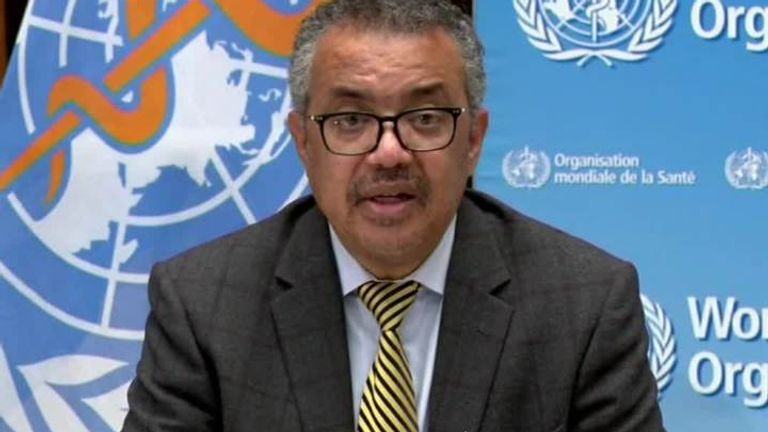Eastern European countries battle vaccine hesitancy as COVID-19 strengthens its grip
Countries in the former communist bloc are struggling to encourage vaccination among large numbers of people who do not trust the state.
Thursday 21 October 2021 22:36, UK
Some European countries are seeing a resurgence in COVID-19, with the continent's eastern nations hampered by widespread vaccine hesitancy.
Polls show that trust in state institutions and public healthcare is much lower in eastern Europe than it is across the rest of the continent, something that has been blamed for the low vaccination rates.
At least one person in every three does not trust the healthcare system in eastern Europe, compared to an EU average of 18%, according to the European Commission.
And when it comes to vaccine uptake, the European states with the lowest rates - Bulgaria, Romania, Poland and Latvia - are all part of the former communist bloc.
• Romania had the highest death rate per capita in the world this week and the number of new cases soared towards 19,000, but only 36% of adults are vaccinated, about half the EU rate. Distrust in public healthcare is put at 40%
• Russia's government announced workplaces will close from 30 October to 7 November after Thursday saw 1,036 deaths and 36,339 new infections - both record daily highs. Despite being quick to produce its Sputnik vaccine earlier in the pandemic, many Russians have refused it - only 48 million of a population of 144 million were fully-vaccinated as of mid-October
• In Bulgaria only one adult in four is fully-vaccinated. The number of people being admitted to hospital due to the virus has risen 30% in the past month, and hospitals in Sofia have halted non-essential surgeries
• Latvia has gone back into lockdown for a month. A study by SKDS has found that among Latvia's Russian-speaking population (who account for about a third of the overall population), only 46% are vaccinated, compared with 62% among ethnic Latvians
• Poland (52% vaccinated) reported more than 5,000 new cases on Wednesday - the highest number since May - prompting the health minister to warn that drastic measures could be necessary. Vaccine uptake is particularly low in conservative areas, leaving the government with extra vaccine doses it has donated or sold abroad
• Slovakia (41% vaccinated) reported its highest daily case numbers on Tuesday since 9 March and in the Czech Republic (56% vaccinated) the number of new cases passed 3,000 for the first time since April
The situation differs in western Europe, where vaccination rates are generally higher and restrictions are being weakened alongside the introduction of vaccination passes in some parts.
• In France, new cases jumped to 6,127, up 18% compared to a week earlier, having already risen by 8% on Wednesday. The country also registered 37 new deaths on Thursday, taking the total to 117,389. About two-thirds of people are fully-vaccinated
• Italy (71% vaccinated) reported 36 deaths on Thursday (up from 33 the day before) with 3,794 new infections (up from 3,702)
• Germany reported just over 17,000 new infections on Wednesday compared to 11,903 a week ago, with its 92 deaths similar to the same day last week. Roughly two-thirds of people are fully-vaccinated. Health Minister Jens Spahn has said the pandemic state of emergency can end on 25 November, although some measures should continue
• Portugal began the year with one of the highest rates of infection in the world but, with 85% fully vaccinated, it is turning things around. Masks are still widely worn and trust in state institutions is generally high. On Wednesday, 927 new cases were reported (up from 828 a week earlier). There were three deaths (down from nine a week earlier)
• Spain reported 2,528 new cases on Wednesday (down from 2,758 a week earlier). There were 31 deaths (down from 42) and 78% of the population is fully vaccinated
The World Health Organisation's emergency director Mike Ryan said: "Most (COVID-19) restrictions are now not in place anymore in many countries, and we're seeing that coincide with the winter period in which people are moving inside as the cold snaps appear.
"The question remains as to whether or not we will have the same experience as last year with health systems coming once again under pressure."







